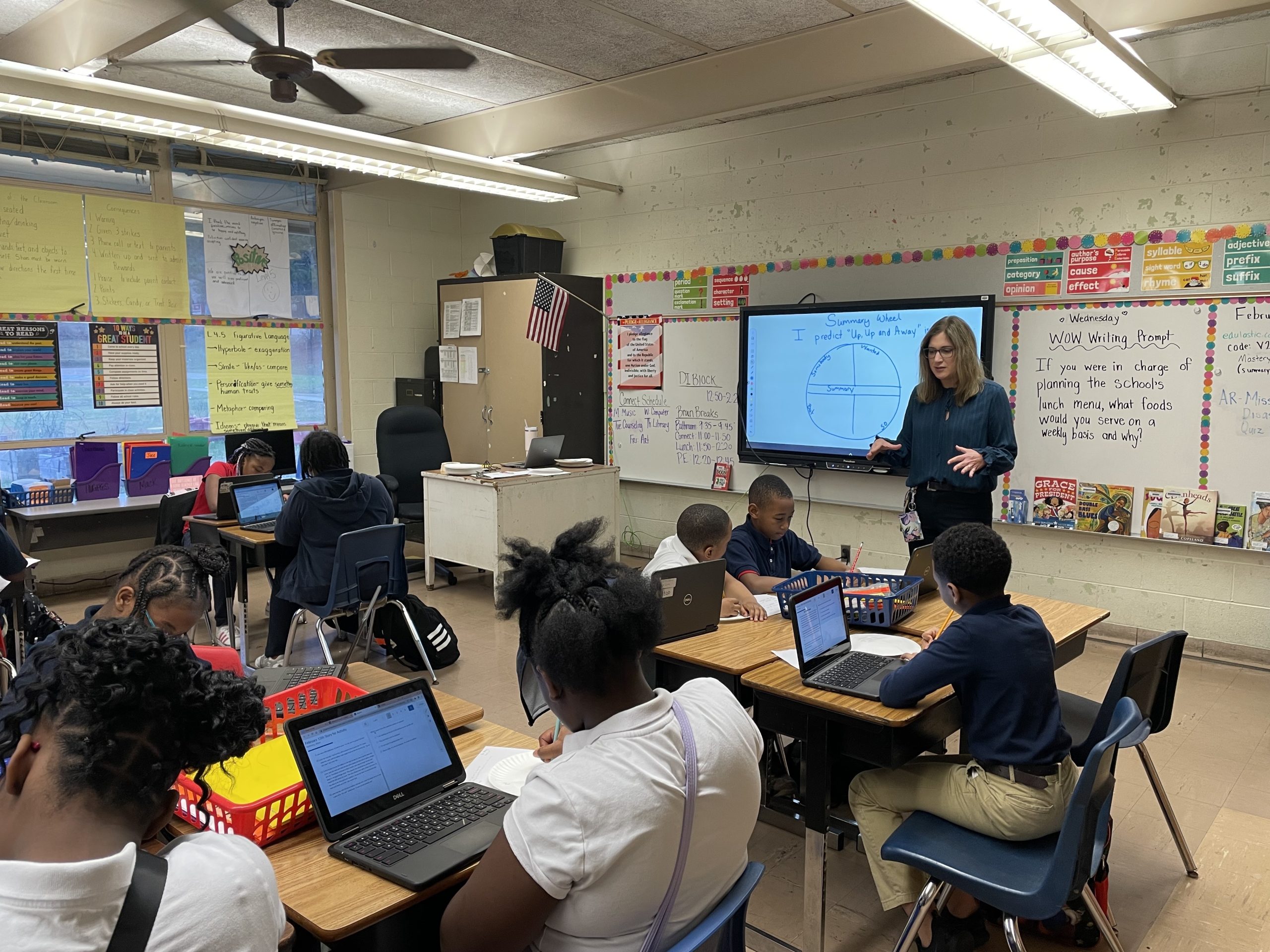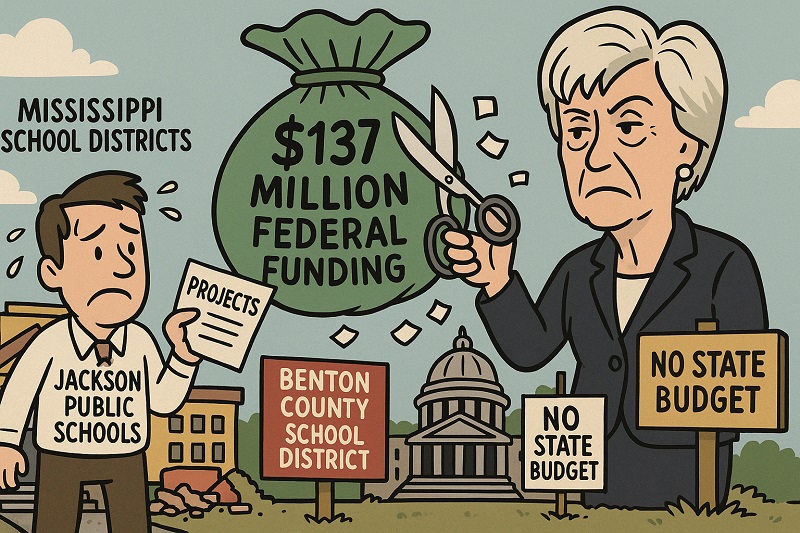Mississippi Today
Public schools are getting an additional $100 million this year. Here’s what that means.


Public schools are getting an additional $100 million this year. Here’s what that means.
After a push this session to fully fund public schools, districts will receive $100 million outside of the regular school funding formula because lawmakers passed a bill they say aims to put more money in the classroom.
While superintendents say they’re grateful for the additional funds, some are pushing back on the notion that the current funding formula doesn’t directly support students.
Senate leaders introduced a plan in early March to give an additional $181 million to public schools by slightly modifying the state’s public school funding formula, the Mississippi Adequate Education Program (MAEP), and fully funding the new version.
The formula was established by the Legislature in 1997 and has been consistently underfunded every year since 2008. MAEP provides the state’s share of money for the basic needs of districts, such as teacher salaries, utilities, textbooks and transportation. Districts have broad discretion when it comes to spending the MAEP dollars, something school leaders say is necessary in order for each district to meet its unique needs.
Despite the plan passing the Senate unanimously, House leadership refused to put more money into the formula, saying they believed it would be used for increased administrative spending and would not benefit students. Instead, House leaders wanted to direct additional funding into specific programs, like the capital improvements loan fund or an assistant teacher pay raise.
“When our folks were calling their legislators repeatedly, House members were telling them ‘We want to fully fund the MAEP, everybody I know over here wants to fully fund the MAEP,’” said Nancy Loome, executive director of public school advocacy group The Parents’ Campaign. “It was Speaker (Philip) Gunn refusing to allow them to vote on a bill that would have fully funded the MAEP. If they had put a bill in front of House members like they did with senators, it absolutely would have passed.”
Neither proposal triumphed, with lawmakers eventually agreeing to give an additional $100 million to school districts outside of the funding formula with the only spending restriction that the money can’t be used to give raises to superintendents, assistant superintendents and principals. The additional funds will be distributed based on enrollment, similar to the funding formula.
“This was a way to get a compromise,” Senate Education Chairman Dennis DeBar said on the Senate floor. “It’s almost the same effect as if it was in the (MAEP) formula.”
The total value of MAEP this year is $2.4 billion, a $38 million increase over last year. Both the $100 million compromise and the $240 million to fund last year’s teacher pay raise were left outside the formula.
READ MORE: Lawmakers, debating MAEP full funding, have plenty of money to spend
Some officials and school leaders disagree with the idea the compromise is nearly the same as MAEP, since allocating the money this way bypasses the portion of MAEP that distributes money based on school need.
“Every school district getting the same amount per pupil, there’s no equity in that,” said Todd Ivey, former chief operating officer at the Mississippi Department of Education. “That was one of the primary reasons the state went to MAEP 20+ years ago, to try to prevent an equity funding lawsuit.”
“I would have preferred it to be put in the formula just because there’s some equity components in the formula that help out schools that maybe aren’t able to generate as much (local tax dollars) as others, accounting for longer bus routes in rural areas, students in poverty,” said Tyler Hansford, Superintendent of the Union Public School District. “But at the same time, I’m not going to complain about additional funding.”
Robert Williams, superintendent of the Hattiesburg Public School District, said he didn’t have an opinion about how the funding was distributed, just that he was grateful to the Legislature for providing the additional money. While the exact total of how much extra each school district will get is not yet available, Williams said he hopes to hire additional school resource officers and continue to invest in counseling and social-emotional supports.
Other districts said the additional funding will save them from having to cut employees that were hired with federal pandemic relief dollars. Chris Chism, superintendent of the Pearl Public School District, said this one will be one focus area for him, the other to give the lowest-paid employees a raise to combat the impact of record inflation. Chism said increased legislative investment in public schools will continue to be critical to overcome these conditions.
Toren Ballard, K-12 policy director for education policy organization Mississippi First, said he expects to see a more detailed conversation about revising the formula next session.
“It seems like, at least in the House, in order to get more money for education the formula is going to have to be rewritten,” he said.
Loome said she is “optimistic” about education funding next session.
“I’m hoping that (House members) are having conversations right now with candidates for speaker and saying, ‘Fully funding our public schools is really important to us, it’s important to our communities,’” she said.
Recent polling shows that full funding of MAEP is very popular, with 79% of respondents saying they support it in a recent Sienna College/Mississippi Today poll.
Superintendent of the Kemper County School District Hilute Hudson said that while he would have liked to see full funding, he appreciates that the compromise struck this year gives schools some more money while also giving legislators more time to revisit the formula.
He also pushed back on the notion that additional money put into the formula would have been used irresponsibly.
“If you look across the state, (school leaders) are taking these funds and trying to put them to the best use for our students. It’s not a situation of trying to inflate salaries,” Hudson said.
This article first appeared on Mississippi Today and is republished here under a Creative Commons license.
Mississippi Today
See how much your Mississippi school district stands to lose in Trump’s federal funding freeze

Mississippi school districts are grappling with the fallout of the Trump administration’s decision to freeze roughly $137 million in federal money and are hoping the U.S. Department of Education will reverse the decision.
Around 70 school districts were relying on the federal Department of Education’s decision under the Biden administration to allow them to spend federal pandemic grant money through next year.
But new U.S. Secretary of Education Linda McMahon notified state and local officials last month that the Trump administration was immediately cutting off the money.
Schools were already spending the money on a range of initiatives, including literacy and mathematics programs, mental health services, construction projects for outdated school facilities, and technology for rural districts.
“We’re really counting on all of our state and federal leaders to understand the predicament that we’re in as local school districts and do whatever it takes to get the federal government to honor this extension,” said Lawrence Hudson, the superintendent of Western Line School District in the Delta.
Hudson told Mississippi Today that his school district had already utilized federal money to renovate the heating and air systems in three old buildings in the district — two former Army barracks and a double-wide trailer — which had inferior ventilation.
The district also planned to use the money to improve ventilation in another building. However, it was unable to complete the project by the original deadline because it needed to take place during the summer break when the kids were not in the building.
Now those plans have been disrupted. Hudson said the district will have to find other money to pay for the project.
Lance Evans, the Mississippi Superintendent of Education, wrote a letter to McMahan saying the federal government failed to provide adequate notice that it would cut off access to money committed to schools during the COVID-19 pandemic, and the action has put school districts like Hudson’s in a bind.
Madi Biedermann, deputy assistant secretary for communications for the federal education department, told Mississippi Today in a statement that the COVID-19 pandemic is over and “school districts can no longer claim they are spending their emergency pandemic funds on ‘COVID relief.’”
“The Department will consider extensions on an individual project-specific basis where it can be demonstrated that funds are being used to directly mitigate the effects of COVID-19 on student learning,” Biedermann said.
Jackson Public School District, one of the largest districts in the state, has approximately $4.5 million in encumbered funds at risk due to the federal government’s decision, according to Earl Burke, the district’s Chief Operations Officer.
Of that amount, JPS had $3.6 million allocated for critical construction projects and just under $1 million designated for instructional support.
“That said, despite our best efforts, it is important to note that some construction projects may not be completed by the start of the school year due to this shift in funding availability,” Burke said.
The funding crunch also comes on the heels of Mississippi legislators voting to end their 2025 session without setting an annual budget.
Mississippi is one of the most federally dependent states in the nation, and the Trump administration, through its Department of Government Efficiency, has made slashing government spending one of its priorities.
Lt. Gov. Delbert Hosemann has said in recent interviews that legislative leaders might consider assisting state agencies that have been affected by federal funding cuts.
Whatever decisions federal and state leaders make, smaller school districts that received the federal money will be impacted.
The Benton County School District, located in rural northeast Mississippi, completed a heating and air conditioning project for one of its buildings, according to Superintendent Regina Biggers. The district paid for the project but was banking on the federal government reimbursing it around $166,000, something that may not now happen.
“This was a tremendous amount of money for a district our size,” Biggers said.
This article first appeared on Mississippi Today and is republished here under a Creative Commons Attribution-NoDerivatives 4.0 International License.![]()
Mississippi Today
Crime lab sees increase in rape kits following new law

Twenty-seven percent more rape kits were sent to the state crime lab in 2024 than the year before in Mississippi.
The increase is thanks in part to a law passed in 2023 to streamline rape kit processing, which officials say resulted in more rape kits making it to the crime lab. However, because Mississippi has no complete rape kit inventory, it’s impossible to tell what impact it made on the backlog.
While variation from year to year is normal, the crime lab has not seen an influx that large in previous years – likely signifying the legislation’s effect, explained Commissioner Sean Tindell of the Department of Public Safety.
But Tindell added that he could not say how many kits, if any, are still getting stalled along the way.
House Bill 485 mandated law enforcement pick up rape kits from hospitals within 24 hours of being contacted, and that they transport the kits to the forensic lab within seven calendar days. It also created a sexual assault task force, whose members designed a system for survivors to track their rape kit as it changes hands.
The tracking system went into operation September 2024, Tindell said. Any rape victim who had a kit done after then can track the status of the kit by putting its serial number into the online system.
The idea was that rape kits could would no longer sit indefinitely in hospital refrigerators or in the trunks of cop cars, and that survivors would be kept in the know – the way patients are for any other hospital procedure.
“They leave the hospital and they don’t know where their kit is, they never hear anything. Can you imagine getting a cancer test and nobody ever calls you back to tell you what it was? For months or years or ever?” asked Ilse Knecht, policy director at End the Backlog, an organization seeking justice for sexual assault survivors through policy work around rape kits.

Backlogged rape kits have long been problem across the U.S. – one that first sparked public outcry in 1999 when it was discovered that New York City was sitting on 17,000 untested rape kits.
“What happened later was that the mayor decided to test them all, which was a years-long process, and there were very important and interesting cases that came out of that,” explained Knecht. “And it started to catch on, the other states started to look at what they had. And we started to get a sense of what was going on across the country.”
The root of the problem isn’t as simple as underfunded crime labs or a lack of resources in law enforcement agencies, Knecht said. It’s also a matter of culture, with some kits never being tested because victims aren’t believed.
“If they’re not the perfect victim, the case is going to be closed before it’s even opened.”
The Mississippi Prosecutors’ Association did not respond to a request for comment on whether the increase in submissions to the crime lab has led to an increase in prosecutions.
Knecht, who has 25 years of experience working in this area, joined End the Backlog in 2015, when she helped develop the group’s policy directives. After collaborating with dozens of sexual assault survivors and various professionals handling rape kits, her team came up with six pillars intended to guide states toward policies to enact meaningful and feasible change.
Mississippi’s 2023 legislation led to the adoption of three of the six pillars End the Backlog recommends: mandating the timely testing of all new kits; implementing mechanisms for survivors to easily find out about the status of their kits; and creating a tracking system for victims.
The other three pillars, which Mississippi does not have, are: implementing an annual statewide inventory of kits; mandating submission and testing of all backlogged kits; and allocating funding to submit, test and track kits.
The timeline the 2023 legislation imposed on law enforcement is more than reasonable, according to Ken Winter, executive director of the Mississippi Association of Chiefs of Police.
“It absolutely has not taken more staff or resources,” Winter said. “The only thing it’s taking is somebody paying attention to the process and making sure the evidence is handled in a timely manner – and they should be doing that anyways.”

House Bill 485 was a bipartisan effort led by Rep. Angela Cockerham, I-Magnolia, and co-authored by Reps. Dana McLean, R-Columbus; Jill Ford, R-Madison; and Otis Anthony, D-Indianola.
McLean said she believed the legislation was the first step to getting justice for sexual assault survivors.
But she later became aware that some rape victims have trouble earlier in the process – getting a rape kit done in the first place. McLean fought to change that this past session, and successfully oversaw the passage of a bill requiring hospitals to stock and perform rape kits.
What makes the problem still more complicated in Mississippi – and four other states – is that the state has not mandated an inventory of rape kits. There is no way to tell the extent of Mississippi’s backlog – or at what point in the process the kits are getting backlogged.
McLean said she hopes to make a mandatory statewide inventory her focus next legislative session.
The issue is dimensional, said Knecht. But the message of the movement is simple: to tell survivors that what they did by receiving a rape kit mattered.
“All of this was created to keep a promise to survivors,” Knecht said. “And to society because guess what – these kits represent dangerous people on the street. And when they’re not tested, we have 100 pages of stories of crimes that maybe could have been prevented if a rape kit had just been tested.”
This article first appeared on Mississippi Today and is republished here under a Creative Commons Attribution-NoDerivatives 4.0 International License.![]()
Mississippi Today
On this day in 1947, Jackie Robinson broke MLB color barrier

April 15, 1947

Jackie Robinson broke through the color barrier in Major League Baseball, becoming the first Black player in the 20th century.
Born in Cairo, Georgia, Robinson lettered in four sports at UCLA – football, basketball, baseball and track. After time in the military, he played for the Kansas City Monarchs in the Negro Leagues. After his success there, Dodgers general manager Branch Rickey signed Robinson, and the legendary baseball player started for Montreal, where he integrated the International League.
In addition to his Hall of Fame career, he was active in the civil rights movement and became the first Black TV analyst in Major League Baseball and the first Black vice president of a major American corporation.
In recognition of his achievements, Robinson was posthumously awarded the Presidential Medal of Freedom and the Congressional Gold Medal.
Major League Baseball retired his number “42,” which became the title of the movie about his breakthrough.
Ken Burns’ four-hour documentary reveals that Robinson did more than just break the color barrier — he became a leader for equal rights for all Americans.
This article first appeared on Mississippi Today and is republished here under a Creative Commons Attribution-NoDerivatives 4.0 International License.![]()
-

 News from the South - Arkansas News Feed6 days ago
News from the South - Arkansas News Feed6 days agoMeasles cases confirmed in Arkansas children after travel exposure
-

 Mississippi Today6 days ago
Mississippi Today6 days agoA self-proclaimed ‘loose electron’ journeys through Jackson’s political class
-

 News from the South - Alabama News Feed6 days ago
News from the South - Alabama News Feed6 days agoImpacts of Overdraft Fees | April 11, 2025 | News 19 at 10 p.m.
-

 News from the South - Alabama News Feed7 days ago
News from the South - Alabama News Feed7 days agoPilot Speaks on Helicopter Crash | April 10, 2025 | News 19 at 10 p.m.
-

 News from the South - Georgia News Feed6 days ago
News from the South - Georgia News Feed6 days ago1-on-1 with Gov. Kemp’s Senior Advisor | Full interview
-

 Mississippi Today5 days ago
Mississippi Today5 days agoOn this day in 1873, La. courthouse scene of racial carnage
-

 News from the South - Missouri News Feed6 days ago
News from the South - Missouri News Feed6 days agoMom and son targeted in carjackings, stolen cars crime spree
-

 Local News5 days ago
Local News5 days agoAG Fitch and Children’s Advocacy Centers of Mississippi Announce Statewide Protocol for Child Abuse Response

















































